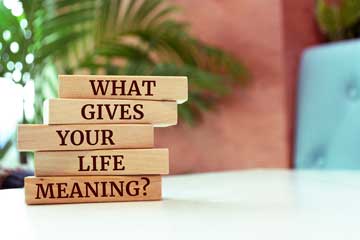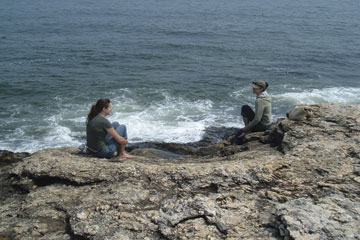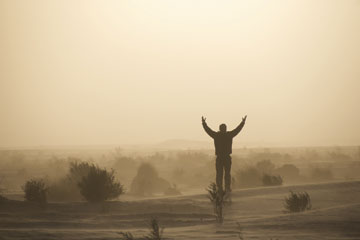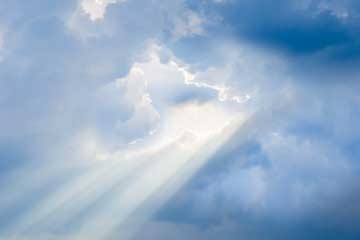We will find happiness when we make wise choices. It is easy to blame our poor choices on circumstances, and to say, “Given the right circumstances I would have chosen well and wisely.” But to think this way is to fail to see our true freedom, and to fail to accept the growth opportunities that the Lord is continually providing for us, both when outer circumstances are positive and when they are difficult. The Lord challenges us to lay up treasures in heaven, not on earth (Matthew 6:19-20). He encourages us to keep our outlook clear—“the lamp of our eye single”—if we want to have light (Matthew 6:22). We must keep our spiritual focus and purpose. And with that focus, we must face the decision of whether to serve God or riches; we can’t serve both (Matthew 6:24). These verses remind us that we must choose, and we will be blessed if we choose a spiritual focus. The Lord encourages us to trust Him. Sometimes we may worry that by choosing a spiritual path we will make life more difficult. But this is not true. He will take care of us if we seek first His kingdom and its righteousness. It is this innocent trust in Him that opens us up to receive His power to choose the higher path, the path that ultimately leads to happiness.
Let me tell you about the experiences of a man we’ll call “John.” John is in a slump. His job is irksome to him—too many routine tasks, nothing exciting on the horizon, not enough challenge. Chores are mounting at home. The cars are due for inspection. Fire wood needs splitting. The deck furniture needs storing. His shirts need ironing, and the list goes on. There are things he’d rather do, but they don’t seem like possibilities. Things are not great with his wife. She has seemed wrapped up in her own busyness. And the children always seem to be her priority. John’s mind wanders away from what he truly values. The choices he makes begin a descent into dark places, and into the consequences : shame, self-loathing, and isolation. It’s a grim place. He does not emerge from it quickly or easily.
Now, a month or so later, things are different for John. There have been changes in his outlook: some hard learning, some better choices through his efforts to turn to God. There have not been great changes at work, and home-life still holds many responsibilities, yet they don’t seem so burdensome. Life with his wife is not all that different, but he feels “closer” to her. He even takes pleasure in her busy life-style and in the way she pays attention to the children’s lives. John feels a satisfying sense of connection with others and a certain contentedness with his life. And when faced with a tempting situation, he chooses not to wander. He’s got better things to do. He’s got a higher sense of direction.
There is no explaining human choice. It’s easy to point to circumstances and excuse John, explaining away his poor choice and saying he wasn’t really free. But he was free. In fact, those situations could be re-cast so that things were going well in his outer life, and yet he might still make that bad choice. And when things were down for him, he might have “toughed it out,” resisted the urge to be selfish, and gained strength and a greater measure of happiness from that choice. There is no explaining human choice.
Consider the experience of Victor Frankl, a Jewish psychiatrist who survived life in a Nazi concentration camp (his wife and parents did not survive). In studying his own and others’ responses to life under those horrendous conditions, he concluded that the meaning of life is found in every moment of living, good and bad, and that we truly are free to choose our response. He wrote:
“Between stimulus and response there is a space. In that space is our power to choose our response. In our response lies our growth and our freedom.
Everything can be taken from a man or a woman but one thing: the last of human freedoms, to choose one’s attitude in any given set of circumstances, to choose one’s own way.”
In considering the issue of our making wise choices, the first thing that we need to accept is that we are free to choose, that we must choose, and that we are responsible for our choices. New Church theology says:
"Let anyone, if he wishes, ask himself whether he can think seventy times a day, or three hundred times a week, about God...and...the spiritual matters of the church. Is he at that moment aware of any compulsion ..., whether or not he has faith? Test yourself too, whatever your present state, to see if you can think anything at all without free will, whether in your conversation, [or] in your prayers to God.... Is not freedom of choice the all-important feature in these actions?" ( True Christian Religion 480; cf. 497)
We are free. And that means that regardless of our situation we can say “Good morning” to the person who has greeted us and mean it. We can let a positive thought “trump” the spontaneous negative thoughts that come to mind. We are free, and responsible. (Victor Frankl noted that we have a Statue of Liberty on the east coast of the USA; he thought we should have a Statue of Responsibility on the west coast.)
Make no mistake: there is pleasure to be had in putting ourselves first in all things, in the challenge of forging our own happiness—engaging in our friendships, in our church life, in our work, with primarily ourselves in mind. There are satisfying things about managing our life for our own convenience, acquiring economic security, maintaining our creature comforts.
These are real pleasures. Choosing them does have some negative consequences. But the path to heaven has negative consequences for the natural part of us, and it always will. That part of us will always need to face short-term barriers to its delights and be required to wait and subordinate itself. The point is that whether we choose heaven or hell there are consequences which we accept as part of that choice. One choice is not inherently less desirable than the other. Heaven is truly a better choice; but what we find more “desirable” no one but ourselves can decide. The individual decides which choice is “life” for him or her, and which one is “death.”
We tip the balance with our choice. Nothing is stopping us from going this way or that. We choose. With equal pressure on us from both sides, why choose to believe in the Lord and follow Him? Why lay up for ourselves treasures in heaven and not just go for the tangible ones we find on earth? Why believe that His way is good and leads to greater blessing?
Ultimately, we believe in the Lord and choose His way because we want to. We all continually feel the pressure to act for self-advantage. There are short-term benefits and pleasures in doing that. We can look back at a history of acting-for- self and think that it’s the easiest thing to do. On the other hand, we can also look back at a rich history of having experienced the satisfaction of denying self and putting ideals first. We’ve all experienced the profound joy of cooperation, and of mutuality in a relationship. We’ve felt the joy of serving without thought of reward. And though we come into times of struggle and doubt and must fight to stay on the path, fight to reassert that choice, fight for what we love, our faith in the Lord sustains us. We know that we will find deeper happiness if we choose His way. We trust Him. We are touched by His truth. We believe His promises. And we are inspired to choose wisely, to choose to be happy, when He reassures us:
"Therefore do not be anxious, saying, ‘What shall we eat?’ or ‘What shall we drink?’ or ‘What shall we wear?’ For after all these things the Gentiles seek. For your heavenly Father knows that you need all these things. But seek first the kingdom of God and His righteousness, and all these things shall be added to you." (Matthew 6.25-33)







